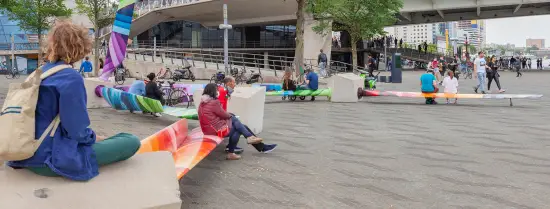Risbo has accumulated much knowledge and expertise around the themes of social safety, crime, and livability. From studies on sexually transgressive behavior in nightlife and violence against LGBTI-persons, to research on the connection between crime and dropping out of school, the spectrum of research projects is very broad. The common denominator is that we conduct research on current and socially relevant topics. the spectrum of research projects is very broad.
Social safety
In 2023, Risbo's involvement includes research into violence against LGBT persons commissioned by the government's Scientific Research and Documentation Center (WODC).
Livability
In recent years, Risbo's research on the theme of livability has included research on the operation of tipping points in the livability of neighborhoods commissioned by the Ministry of the Interior and on the deteriorating livability in the Rotterdam neighborhood of Beverwaard. Next to that, Risbo has performed research on the social cohesion, labor migration, and labor extortion on behalf of the municipality of Rotterdam. Risbo also conducted research on the relationship between COVID-19 and neighbourhood tensions and nuisances. Previously, Risbo was involved in the study "Social Reclaiming in Amsterdam and Rotterdam" in collaboration with the Erasmus Faculty of Social Sciences for the Scientific Council for Government Policy (WRR). Here we focused on whether and how disadvantaged neighborhoods can break through problem spirals.
Research methodology and clients
Many of these studies take place in close collaboration with colleagues from the Faculty of Social Sciences and the Department of Criminology at Erasmus University. In these studies we make use of police registrations, among other things, but we also regularly conduct (ethnographic) fieldwork: among the groups themselves and among expert experts on the topic. Furthermore, in a number of studies we have conducted quantitative research into the criminality of the groups and their social position in the Netherlands. For each study, we look for the best approach in consultation with the client. We use quantitative data analyses of register files, large-scale surveys and qualitative (ethnographic) fieldwork among hard-to-reach groups. Where possible, we cooperate with academic partners within Erasmus University, such as those at the Faculty of Social Sciences and the Department of Criminology.
Our clients include municipalities, ministries, the WODC and Police and Science.
Contact
- Youri Seidler
Researcher
Email address - Romy van Leeuwen
Researcher
Email address - Paul van Wensveen
Researcher
Email address
